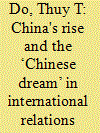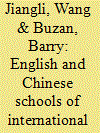| Srl | Item |
| 1 |
ID:
142021


|
|
|
|
|
| Summary/Abstract |
The rise of China/East Asia and the perceived decline of the US/West pose an emerging question about how international relations (IR) theory should respond to this change. Increasingly, there have been heated discussions among Chinese IR academics over a desirable Chinese contribution to IR theory (IRT), particularly the possibility of building a distinctive Chinese IRT. Inevitably, this drive towards theorizing from a Chinese perspective also creates a backlash among not only Western but also other Chinese scholars as they question the ‘nationalistic’ if not ‘hegemonic’ discourse of the scholarship. Drawing on the sociology of scientific knowledge framework, this article examines the linkages between the vibrant dynamics of the Chinese theoretical debates and the actual practices of Chinese scholars in realizing their claims. It suggests that this investigation can serve as a springboard into a better appreciation of the theory–practice and power–knowledge relationships in the context of Chinese IR.
|
|
|
|
|
|
|
|
|
|
|
|
|
|
|
|
| 2 |
ID:
131992


|
|
|
|
|
| Publication |
2014.
|
| Summary/Abstract |
This article compares the academic histories of the so-called 'Chinese School' and the English School in the six dimensions of origin, founders, and organization; naming; context; aims/intentions; theory sources; and historical projects. The English School is mature enough to present fairly clear contents for each section, but as the Chinese School is much newer and still hotly contested as a concept, many things about it are uncertain and controversial; it lacks a single defining concept or frame. The opportunity at hand, therefore, is to apply the experience of the English School to the formative process of a Chinese School or schools, at the same time making clear the considerable differences that time, place and circumstance make to the two projects. The article concludes by looking at possible lessons for the development of International Relations (IR) theory in China, both from what the English School has accomplished and for which it has been criticized. Along the way we provide a bibliographical introduction to both projects.
|
|
|
|
|
|
|
|
|
|
|
|
|
|
|
|
| 3 |
ID:
172119


|
|
|
|
|
| Summary/Abstract |
Over the years, this author has been involved in the ‘Chinese school of International Relations (IR)’ debate. In this article I try to reflect on these discussions or debates from which some insights can be retrieved to inform future research and further growth of a Chinese School of IR. Should a Chinese school be set as the goal? If so, how should this be pursued? This debate and the relevant efforts have proved to be a promising movement in the Chinese IR community, demonstrating that a Chinese school of IR is inevitable and it actually is evolving. A theory is a generalization or cluster of generalizations. This article argues that from the ‘Tsinghua approach’, a ‘moral realism’ has sprung up. Qin Yaqin’s theorizing is centered around relationality and has been productive. A theory of symbiosis in the world community is being developed by a group of Shanghai-based scholars, and a ‘symbiosis school’ has grown up. Overall, four distinct theories of Chinese origins, i.e., relational theory, moral realism, tianxia theory and gongsheng/symbiotic theory, have appeared. Thus, IR theory-building in China in the first two decades of the 21st century has rendered the question ‘why there is no IR theory in China’ obsolete.
|
|
|
|
|
|
|
|
|
|
|
|
|
|
|
|